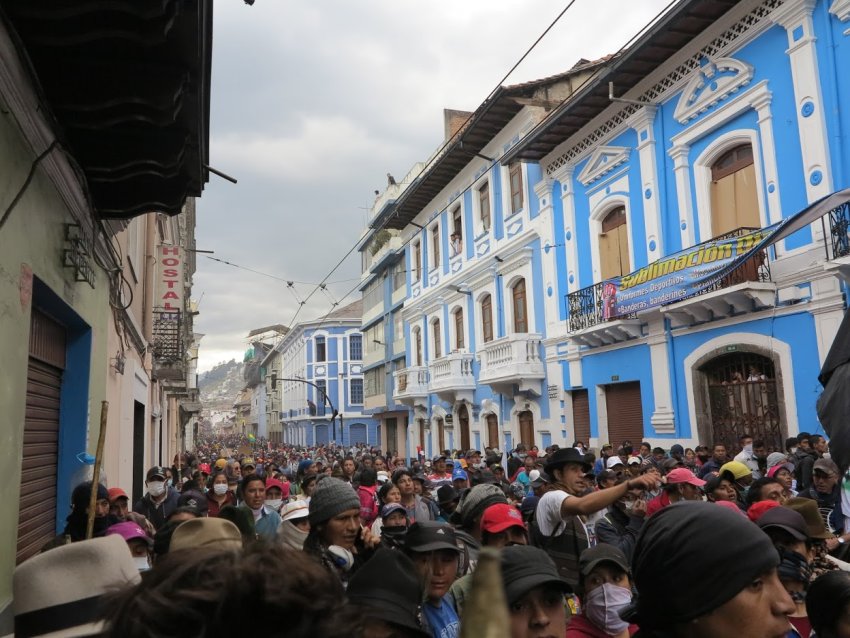
In a victory for the social movement that brought Ecuador’s capital, Quito, to a halt for 11 days, Decree 883 — which had scrapped fuel subsidies — was finally repealed on October 15.
Following the announcement by President Lenin Moreno that the decree would be scrapped on October 13, Indigenous group CONAIE’s president Jaime Vargas said: "We have repealed the Decree 883, they have confirmed to me that … all the tariffs will have to be normalised, this fight is not only of the Indigenous peoples, but for all Ecuadorians."
In an exhaustingly violent struggle, the Ecuadorian people maintained an unshakable level of energy and determination, through to the very end.
On the morning of October 3, workers across Ecuador awoke to find that the price of petrol had more than doubled, signaling an end to a subsidy that had been in place for more than 40 years.
This was only a part of a series of austerity measures pushed by Moreno and intended to facilitate access to a US$4.2 billion International Monetary Fund (IMF) loan. But it was perhaps the most graphic expression of the extreme neoliberal direction that Moreno is attempting to steer the country in.
It followed Moreno’s decision in June to allow United States anti-narcotics planes to use an airstrip in the pristine Galapagos Islands and his decision to evict Julian Assange from Ecuador’s London embassy earlier this year.
Ecuadorians are acutely aware of what Moreno is trying to do.
Discontent with the state of affairs in the government certainly did not begin with Moreno, although they have indeed been worsened since his election in 2017.
Former President Rafael Correa’s land and water policies, which included the authorisation of open cut mines and concessions to foreign companies on Indigenous land without consultation, sparked protests in the country.
Moreno has continued a policy of aggressive extraction, only to find thousands of Indigenous people marching from all corners of the country, including from the deepest recesses of the Amazon, as one protestor told me, to “lead the people forward”.
This was truly awe-inspiring in practice. Meetings of Indigenous leaders from across the nation took place in Quito’s House of Culture, which they appropriated as a shelter and central organising space. There was absolute respect in this movement for Indigenous knowledge and struggle amongst workers, students and farmers.
The murder of Indigenous leader Segundo Inocencio Tucumbi Incubio from Cotopaxi Province marked a culmination of protesters’ anger towards the state violence being waged upon them. This included nightly tear-gas bombings of the universities and the House of Culture, where activists and their families, who had travelled from around the country, had been taking refuge.
According to local news source, Radio Pichincha, whose headquarters was raided by police during the protests, 1152 people had been detained, 7 had been killed, and 1340 were reported injured as at October 13.
The Ecuadorian peoples’ victory, in forcing the government to retract a neo-imperial decree through a spontaneous, yet highly-organised social movement, is a testament to the power of grassroots organising.
Wandering through the protest camps, seeing people having meetings, sorting through the excess food, clothing and medicine donated by the citizens of Quito; it seemed as if everybody had found their place in this movement and was fulfilling it.
However, it would be unduly optimistic to celebrate this as the end of the struggle for good in this country.
Activist group, Vientos del Pueblo (Winds of the People), responded on social media to the October 13 announcement, outlining the injustices that Ecuadorians will have to continue to struggle against, including: the struggle against the IMF measures (of which the decree was just a part) which are being progressively implemented in Ecuador; the issue of mining, which is central to Indigenous struggle; the class nature of Ecuador’s state and military that serves the interests of the economic elites and not the people; the need for the state and Moreno himself to answer for the violence committed against the people; and the continuing fight needed against the government’s measures, against imperialist domination and for revolutionary transformation “to guarantee a quality of life”.
The momentum and lessons gained from these past 11 days will be crucial to continuing the struggle against imperialism and capitalism in Ecuador.
Australia has a lot to learn from the bravery and determination of the people of Ecuador, who forced back the government through large-scale rebellion.
[Jelena Rudd is a student and freelance journalist currently based in Quito.]